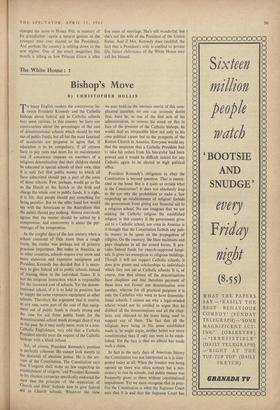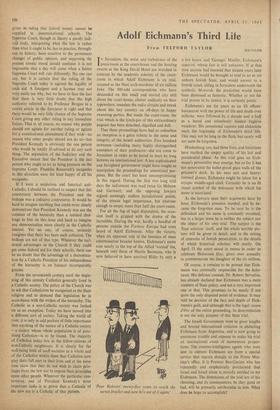The White House: 2
Bishop's Move
By CHRISTOPHER HOLLIS rro many English readers the controversy be- 1 tween President Kennedy and the Catholic bishops about federal aid to Catholic schools may seem curious. In this country we have our controversies about the percentages of the cost of denominational schools which should be met out of public funds, but all but the most fanatical of secularists are prepared to agree that, if education is to be compulsory, if all citizens have to pay rates and taxes for its maintenance and if conscience imposes on members of a religious denomination that their children should be educated in special schools of their own, then it is only fair that public money to which all have subscribed should pay a part of the costs of those schools. Few, perhaps, would go so far as the Dutch or the Scotch or the Irish and charge the whole cost to public funds. It is right, it is felt, that people should pay something for being peculiar. But on the other hand few would say with the Americans or the Australians that the public should pay nothing. Almost everybody agrees that the matter should be settled by a compromise, and controversy is about the per- centages of the compromise.
In the simpler days of the last century when a school consisted of little more than a rough room, the matter was perhaps not of primary practical importance. But today in America, as in other countries, schools require ever more and more elaborate and expensive equipment and President Kennedy has decided that it is neces- sary to give federal aid to public schools instead of leaving them to the individual States. It is not the religious instruction which is responsible for the increased cost of schools. Yet the denom- inational school, if it is to hold its position, has to supply the same expensive equipment as other schools. Therefore the argument that it receive, at any rate, some part of the cost of that equip- ment out of public funds is clearly strong and the case for aid from public funds for the denominational school much stronger than it was in the past. So it may easily seem, even to a non- Catholic Englishman, very odd that a Catholic President should meet the request of the Catholic bishops with a blank refusal.
Yet, of course, President Kennedy's position is perfectly coherent. He cannot look merely to the demands of absolute justice. He is the ser- vant of the Constitution. The Constitution says that 'Congress shall make no law respecting an establishment of religion,' and President Kennedy in his election campaign specifically endorsed the view that the principle of 'the separation of Church and State' forbade him to give federal aid to Church schools. Whatever the view we may hold on the intrinsic merits of this com- plicated question, no one can seriously doubt that, were he, as one of the first acts of his administration, to reverse his stand on this in face of the pressure of the Catholic bishops, he would deal an irreparable blow not only to his own political career but to the prospects of the Roman Church in America. Everyone would say that the suspicion that a Catholic President had to take his orders from his hierarchy had been proved and it would be difficult indeed for any Catholic again to be elected to high political office.
President Kennedy's obligation to obey the Constitution is beyond question. That is nomin- ated in the bond. But is it quite so certain what is the Constitution? It does not absolutely leap to the eye why the prohibition to make a law respecting an establishment of religion' forbids the government from giving any financial aid to a religious school. No one imagines that we are making the Catholic religion the established religion in this country if the government gives aid to a Catholic school, nor even in America is it thought that the Constitutioti forbids any pub- lic money to be spent on the propagation of religion. On the contrary, the State maintains and pays chaplains in all the armed forces. It pro- vides federal funds for church-supported hospi- tals. It gives tax-exemption to religious buildings. Though it will not support Catholic schools, it does give grants and scholarships to individuals which they can use at Catholic schools. It is, of course, true that almost all the denominations have chaplains and that therefore payment of them does not favour one denomination over another, whereas for all practical purposes it is only the Catholics who want to have denomina- tional schools. I cannot see why a legal-minded atheist would not be entitled to argue that he disliked all the denominations and all the chap- lains and objected to his taxes being used to support any of them. The fact that all the religions were being in this sense established made it, he might argue, neither better nor more constitutional than if only one were to be estab- lished. Yet the fact is that no atheist has made such a claim.
In fact in the early days of American history the Constitution was not interpreted as it is inter- preted today at all. When the frontier was being opened up there was often nobody but a mis- sionary to run its schools, and public money was frequently given to them without constitutional impediment. Yet we must recognise that in prac- tice the Constitution is what the Supreme Court says that it is and that the Supreme Court has given its ruling that federal money cannot be supplied to denominational schools. The Supreme Court, though in theory a purely judi- cial body, interpreting what the law is rather than what it ought to be, has in practice, through- out its history, been sensitive to the permanent changes of public opinion, and supposing the present eirenic mood should continue it is not impossible that a day will come when a future Supreme Court will rule differently. No one can say, but it is certain that the ruling of the Supreme Court today is against the legality of such aid. A foreigner and a layman may not very easily see why, but we have to face the fact that there is very little doubt that the high authority referred to by Professor Brogan in a recent article in the Spectator is right and that there would be very little chance of the Supreme Court giving any other ruling in any immediate future. That is, of course, no reason why people should not agitate for another ruling or agitate for a constitutional amendment if they wish—no reason why other people should not do so—but President Kennedy is obviously the one person who would be totally ill-advised to do any such thing. The separation of the Judiciary and the Executive means that the President is the last person who ought to try to bring pressure on the Supreme Court. Franklin Roosevelt's escapades in this direction were the least happy of all his escapades.
If I were a suspicious and fanatical anti- Catholic, I should be inclined to suspect that this controversy between the President and the bishops was a collusive controversy. It would be hard to imagine anything that could more clearly demonstrate that President Kennedy was not the creature of the hierarchy than a resisted chal- lenge to him on this issue and hard to imagine any demonstration more clearly in the Catholic interest. Yet no one, of course, seriously imagines that there has been such collusion. The bishops are not of that type. Whatever the inci- dental advantages to the Church if they could get some federal aid for their schools, there can be no doubt that the advantage of a demonstra- tion by a Catholic President of his independence of the hierarchy is on balance incomparably greater.
From the seventeenth century until the begin- ning of this century Catholics generally lived in a Catholic society. The policy of the Church was to ask that Catholicism be recognised as the State religion and to demand that legislation be in accordance with the wishes of the hierarchy. The Catholic in a non-Catholic society was looked on as an exception. Today we have moved into a different sort of society. Taking the world all over, it is only in odd pockets of little importance that anything of the nature of a Catholic society —a society whose whole population is of prac- tising Catholics—is to be found. The majority of Catholics today live as the fellow-citizens of non-Catholic neighbours. It is clearly for the well-being both of sucli societies as a whole and of the Catholics within them that Catholics now play their full part in their lives and at the same time show that they do not wish to claim priv- ileges from the law nor to impose their principles upon other people. Whatever the particular con- troversy, one of President Kennedy's most important tasks is to prove that a Catholic of the new era is a Catholic of that pattern.















































 Previous page
Previous page